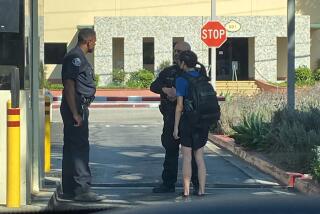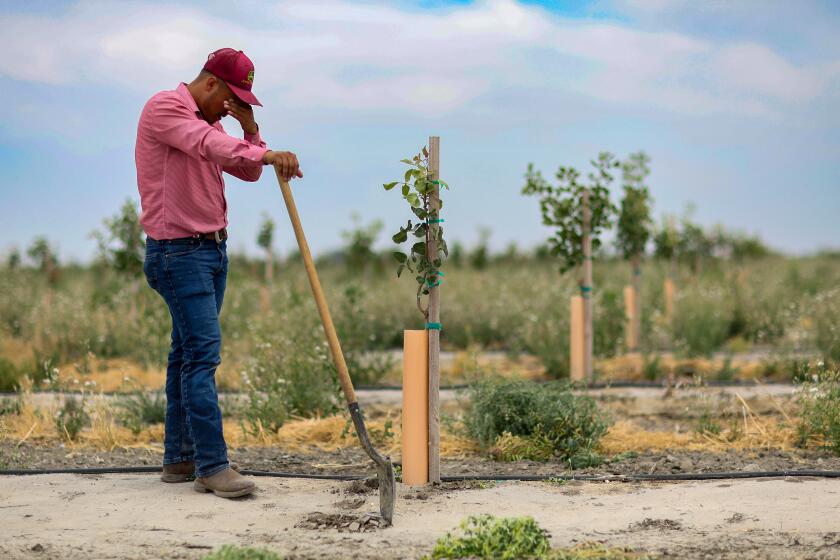Rights Violated : Police Officer Awarded $20,000 From the ACLU
A jury decided Wednesday that the American Civil Liberties Union violated the rights of a police officer, the first time the renowned defender of American freedoms has been found to have trodden on the rights of others.
Orange County Superior Court jurors fixed damages at $20,000 in favor of Newport Beach Police Sgt. Richard T. Long, who had sued for violation of his rights after he was ejected from a 1980 ACLU meeting on the subject of police spying.
The case was a bizarre, though potentially significant, footnote to disclosures of improper Los Angeles Police Department spying on lawful citizens and organizations early in this decade. The scandal, enlarged by an ACLU lawsuit, led to reorganization of police surveillance operations.
“We’re extremely happy that a majority of jurors felt that what had happened to Richard Long was wrong,” said Jeffrey M. Epstein, the police officer’s lawyer.
“It’s ironic that the ACLU, a champion of civil liberties, has now been found to have violated Richard Long’s rights,” he said.
Defense lawyers said they would appeal and expressed confidence that the verdict would be overturned.
The appeal will center on the right of all citizens to “talk back” to government employees and involves significant free speech questions, according to Robin Meadow, the lead defense attorney who volunteered his time on the case.
“We have never been sued for civil rights purposes, anywhere,” said Meir J. Westreich, staff attorney for the Southern California chapter and co-counsel during the three-week trial.
In 1980, Long attended a daylong public seminar sponsored by the ACLU at Newport Harbor High School. He was not in uniform but had been told by a superior to attend. He collected overtime for being there.
Long took extensive notes and tape-recorded one session, all with the intention of reporting back to superiors, he testified. Long denied he was a police spy and testified that he identified himself as a police officer when asked.
Long said when seminar participants Rees Lloyd and Linda Valentino realized he was a police officer, they publicly humiliated him and ejected him from the meeting.
Valentino, with the American Friends Police Surveillance Program, and Lloyd, then a staff attorney for the ACLU Foundation, had helped expose police spying in Los Angeles involving the now-defunct Public Disorder Intelligence division.
Jurors concluded, 11 to 1, that humiliation of Long in the public meeting was calculated, and his rights under the Unruh Act, California’s basic civil rights legislation, were violated.
They assessed damages at $10,000 against Lloyd, $9,000 against the ACLU and $1,000 against Valentino. But Westreich said any damages remaining after appeal would be paid by the ACLU of Southern California.
Jury foreman Eve Jackson of Westminster said the jury spent two days making a “tough” decision. There was wide disagreement over what damages Long deserved, with several jurors believing he had not been harmed at all, Jackson said.
Long was a community relations officer in 1980. He testified that publicity about the incident undercut his ability to serve as liaison to community groups. Long testified the humiliation he suffered interfered for a time with his plans to marry.
“I’m much more concerned about the impact on civil rights than I am about $10,000 against Rees Lloyd,” Lloyd said. “A lot of people might hear about it and be scared, and say ‘I better shut up.’
“I don’t think this thing will stand up for five minutes in the court of appeal,” said Lloyd, now an attorney in private practice.
Lloyd insisted at the trial that he only wanted to know whether Long was on duty and what he planned to do with his notes and tape-recording. He and Valentino both maintained that Long was never kicked out of the meeting at all, only questioned.
Jackson said jurors believed the ACLU had advertised and staged a public meeting and could not fairly exclude law enforcement personnel without advance notice.
The ACLU argued that the questioning of Long was merely a matter of protecting free speech and rights of free association.
Meadow said: “The issue is that people ought to be free to say whatever they want, to a police officer or to the president or to the mayor or to anybody else. And they shouldn’t have to worry about whether they’re going to get sued by somebody for what they have to say.”
Epstein said jurors saw through that as a “pretext” for humiliating Long. The ACLU was free to ask law enforcement officers to identify themselves but not to exclude them from public meetings, Epstein said.
The lawsuit was almost settled last year when the ACLU offered to provide $1,000 to fund a high school essay contest, but Long rejected the offer because he thought the topic could be manipulated to make the contest appear to be oriented against law enforcement in general.
Long’s lawsuit was initially funded by a group called Americans for Effective Law Enforcement, once billed as a conservative rival to the ACLU. The group has not been involved for several years, Epstein said.
A parallel but separate lawsuit was filed by the ACLU against the Newport Beach Police Department, alleging that the department engaged in illegal surveillance and spying. But in a stinging defeat last year, a judge dismissed the lawsuit as groundless, ruling the ACLU had failed to demonstrate any evidence of a spying program.
Long, who attended the lengthy trial, was away with his family on a camping trip and could not be reached for comment.
At the trial he testified that he is “a person. I also happen to be a police officer. I have as many rights as anybody else.”
More to Read
Sign up for Essential California
The most important California stories and recommendations in your inbox every morning.
You may occasionally receive promotional content from the Los Angeles Times.






